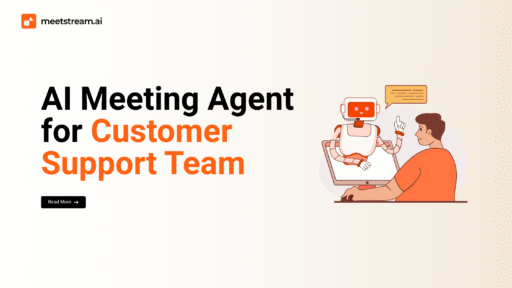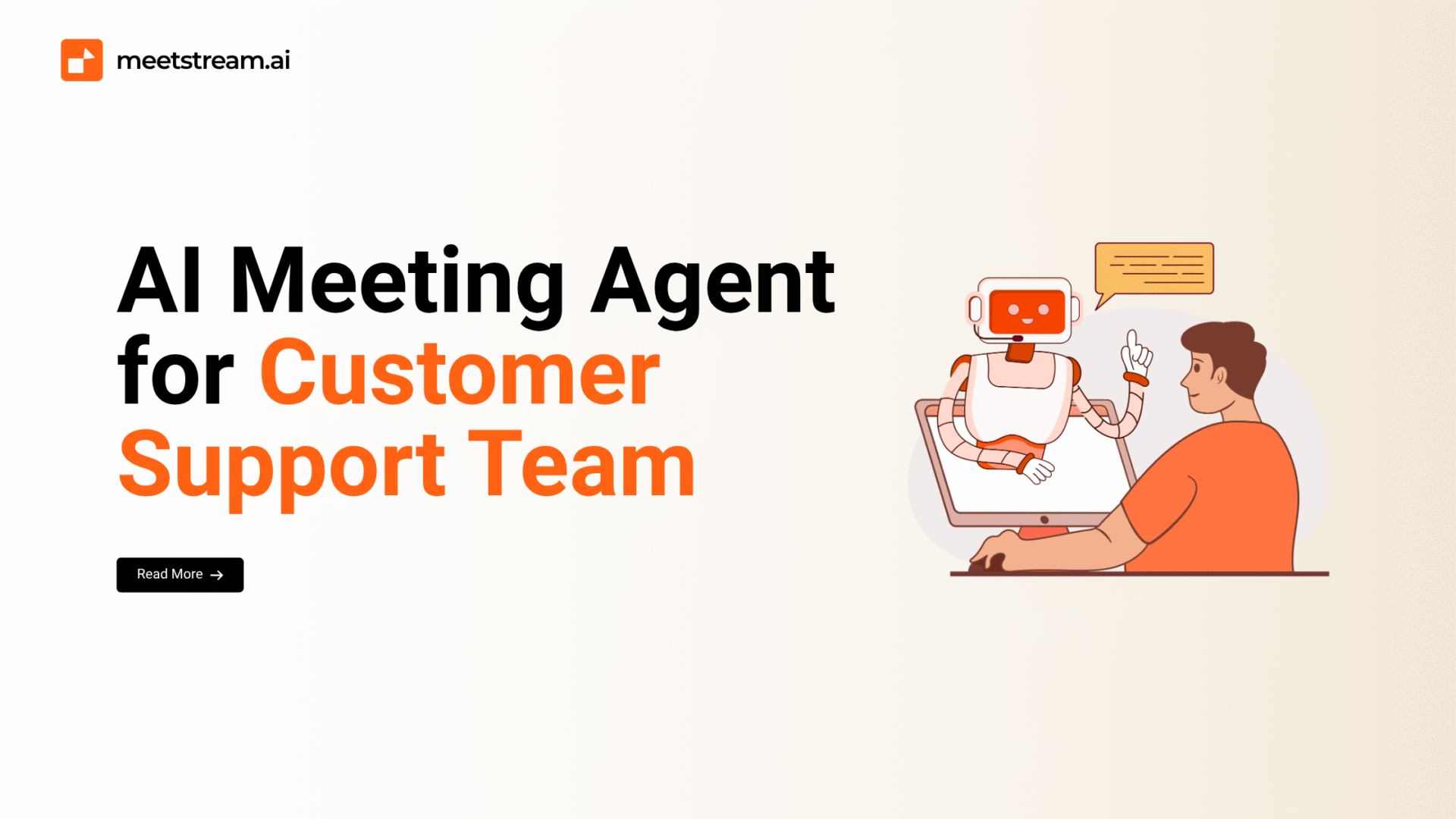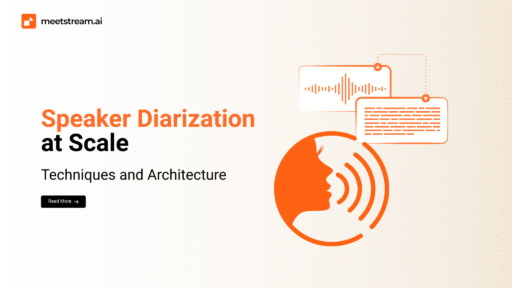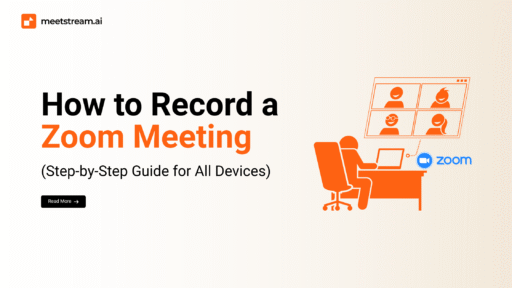Customer support has evolved beyond reactive issue resolution—it is now a central pillar of customer experience (CX).
To maintain high satisfaction scores, minimize churn, and improve operational efficiency, support teams rely on a steady cadence of recurring meetings.
These include daily standups to review ticket queues and blockers, escalation reviews for SLA-breached cases, cross-functional syncs with product and engineering, quality assurance audits, and performance coaching sessions.
However, these essential meetings often produce a deluge of unstructured and inconsistently documented information.
Critical decisions get lost in lengthy recordings, notes are captured unevenly, and tasks frequently slip through the cracks.
This lack of standardized documentation hampers productivity, weakens follow-up discipline, and undermines collaboration, especially within distributed or global support teams.
AI meeting agents are transforming this landscape. These intelligent virtual assistants join meetings in real time, transcribe discussions, extract action items, and generate structured summaries.
By removing the burden of manual note-taking, they enable teams to stay engaged in conversation while ensuring every detail is captured, categorized, and made actionable.
What Are AI Meeting Agents for Customer Support?
AI meeting agents are voice-activated, real-time assistants engineered to optimize support team workflows by transforming spoken dialogue into actionable intelligence.
These AI tools integrate with popular platforms like Zoom, Google Meet, and Microsoft Teams, offering live transcription that supports multiple speakers and handles industry-specific jargon typical in customer service.
Advanced NLP capabilities allow these agents to summarize discussions, highlight key decisions, extract follow-up tasks, and assign responsibilities—all autonomously.
Many also offer integrations with support platforms such as Zendesk, Freshdesk, Intercom, and Salesforce, syncing notes and actions directly to relevant tickets or customer records.
This ensures every meeting, whether a ticket escalation, QA review, or cross-functional sync, results in structured, searchable documentation.
A notable example is MeetStream, an API to create meeting bots for different purposes of the customer support team.
It features real-time speaker identification, CRM syncing, and intelligent summarization designed to fit the operational needs of help desks and CX teams.
Use Cases of AI Meeting Agents in Support Environments
1. Ticket Escalation and Priority Reviews
High-priority or escalated tickets require rapid, informed collaboration.
AI agents ensure that these urgent meetings are accurately documented, capturing context like service interruptions, customer frustrations, and support history.
AI also identifies and assigns responsibilities, creating clarity and accountability.
By linking discussions to KPIs such as CSAT or potential revenue risk, these agents help prioritize support actions that have the highest business impact.
2. Daily Support Standups
Support teams often hold brief daily syncs to discuss open tickets, blockers, and progress updates.
AI meeting agents record and transcribe each update, automatically extracting tasks and distributing summaries.
For distributed or shift-based teams, this ensures that insights are seamlessly handed off across time zones, maintaining service continuity and efficiency.
3. Quality Assurance and Coaching
QA and coaching sessions are more effective when performance feedback is reliably captured.
AI agents document these sessions, turning feedback into structured data that can be tracked over time.
This helps managers monitor agent improvement, reinforce coaching goals, and create consistent performance benchmarks.
These transcripts can also serve as compliance evidence for audits or HR inquiries.
3. Cross-Functional Syncs with Product or Engineering
Support teams often serve as the frontline for discovering product issues or recurring bugs.
During cross-functional syncs, AI agents log this feedback and tag it to product boards or internal systems like Jira.
By tying customer issues directly to meetings, the AI ensures product teams receive timely, structured insights that accelerate triage and response.
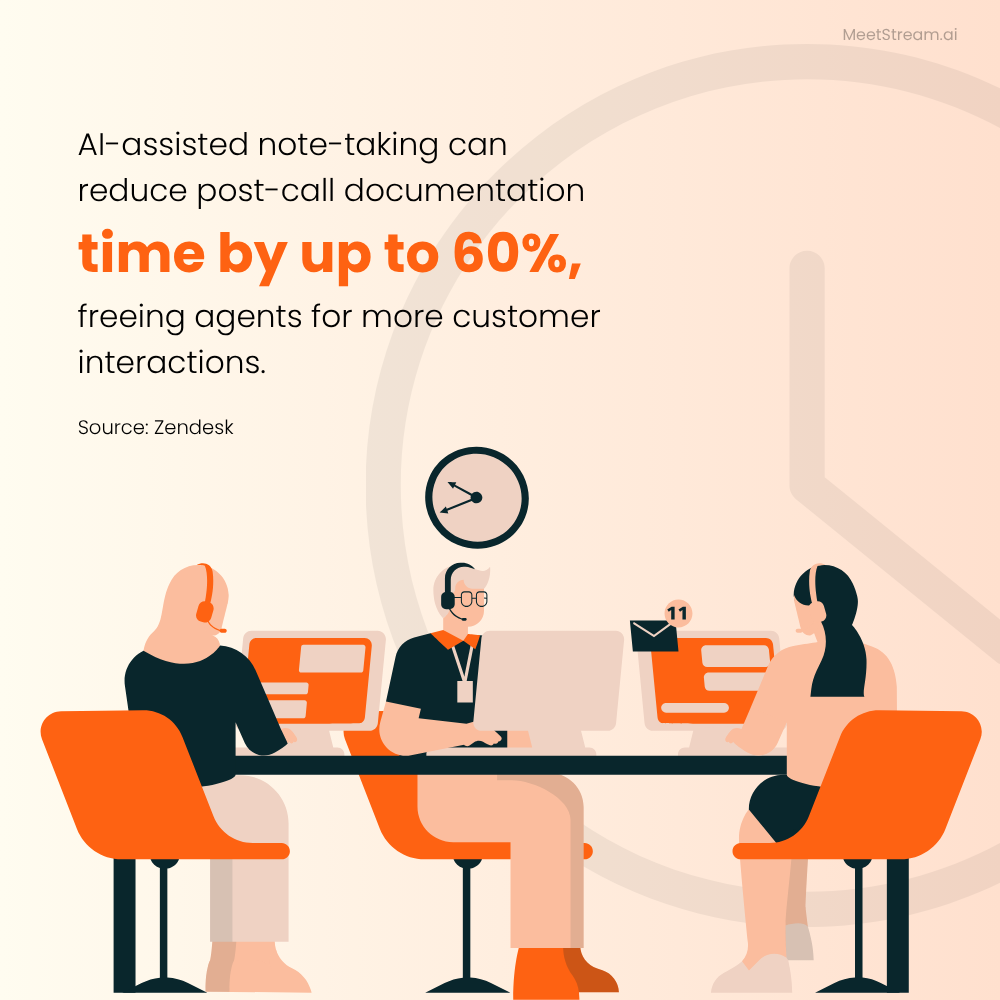
Benefits of AI Meeting Agents for Customer Support Teams
1. Increased Efficiency and Reduced Manual Effort
Traditional meeting workflows—note-taking, recording reviews, manual summaries—are time-consuming and prone to human error.
AI meeting agents streamline this process, letting team members focus on the conversation. Post-meeting follow-up is also faster, with instant task lists and summaries available immediately.
Most importantly, documentation becomes consistent across meeting types.
Whether it’s a QA session or an escalation meeting, AI ensures a uniform format, improving transparency and enabling easy reference for all team members.
2. Actionable Summaries and Task Management
One of the biggest operational gaps in support meetings is follow-through. AI meeting agents bridge this by automatically detecting tasks and assigning them to individuals in real time.
Commitments such as “I’ll follow up with the customer” are logged, tagged to the relevant ticket, and synced with platforms like Salesforce or Zendesk.
This promotes accountability, improves SLA compliance, and enhances overall support performance.
3. Enhanced Team Transparency and Collaboration
Support teams rarely operate in isolation. With AI-generated transcripts and summaries, key stakeholders from product, engineering, legal, or operations can easily stay in the loop.
This cross-departmental visibility improves alignment, speeds up resolution times, and provides a trustworthy record of what was discussed and decided.
It also enables better resource allocation by highlighting recurring pain points and bottlenecks.
4. Better QA and Coaching Insights
Structured, AI-captured coaching transcripts help support leaders measure agent performance over time.
These can be used to onboard new hires, reinforce best practices, and tailor training programs.
Additionally, sentiment analysis and escalation alerts allow managers to proactively address problematic interactions or customer dissatisfaction.
These insights not only improve agent skillsets but also create a culture of continuous learning, accountability, and improvement—cornerstones of a high-performing support operation.
Key Features to Look for in AI Meeting Agents for Support Teams
1. Real-Time Transcription and Summarization
AI tools should provide accurate, multi-speaker transcription, including support-specific terminology.
They must perform reliably in various environments, including remote and hybrid setups, and support real-time summarization to boost productivity post-meeting.
2. Ticketing and CRM Integrations
Deep integration with support ecosystems is critical.
The AI should be able to recognize ticket numbers, customer supports, and agent roles, syncing all content with tools like Zendesk, Freshdesk, Intercom, Jira, Notion, and Slack to maintain a fluid support workflow.
3. Task Identification and Ownership Tracking
NLP-driven agents must automatically capture follow-ups and commitments, linking them to individuals with specific due dates.
These tasks should appear in post-meeting summaries and be integrated into project management systems to ensure visibility and accountability.
4. Sentiment Analysis and Escalation Alerts
AI should go beyond transcription by analyzing conversation tone and identifying high-risk or emotionally charged interactions.
This enables proactive manager involvement and timely escalation handling. Positive interactions can also be flagged and used for training purposes.
5. Security and Compliance Readiness
When handling sensitive customer data, robust security is non-negotiable.
Look for AI meeting agents that offer end-to-end encryption, role-based access control, and comprehensive audit logs to meet internal standards and regulatory requirements.
Final Thoughts
The evolution of customer support demands smarter tools, and AI meeting agents are leading the charge. These tools are indispensable for:
- Minimizing manual note-taking
- Speeding up team coordination
- Enabling better training and QA
- Driving consistent accountability across meetings
MeetStream is an AI meeting API purpose-built for customer support teams, helping them work smarter and deliver better service.
By automating documentation and follow-ups, AI meeting assistants help CX leaders focus on high-value activities such as strategic planning, agent development, and customer retention.
Tools like MeetStream exemplify how AI can be purpose-built for customer support, transforming team communication and raising the standard of service delivery across the board.

